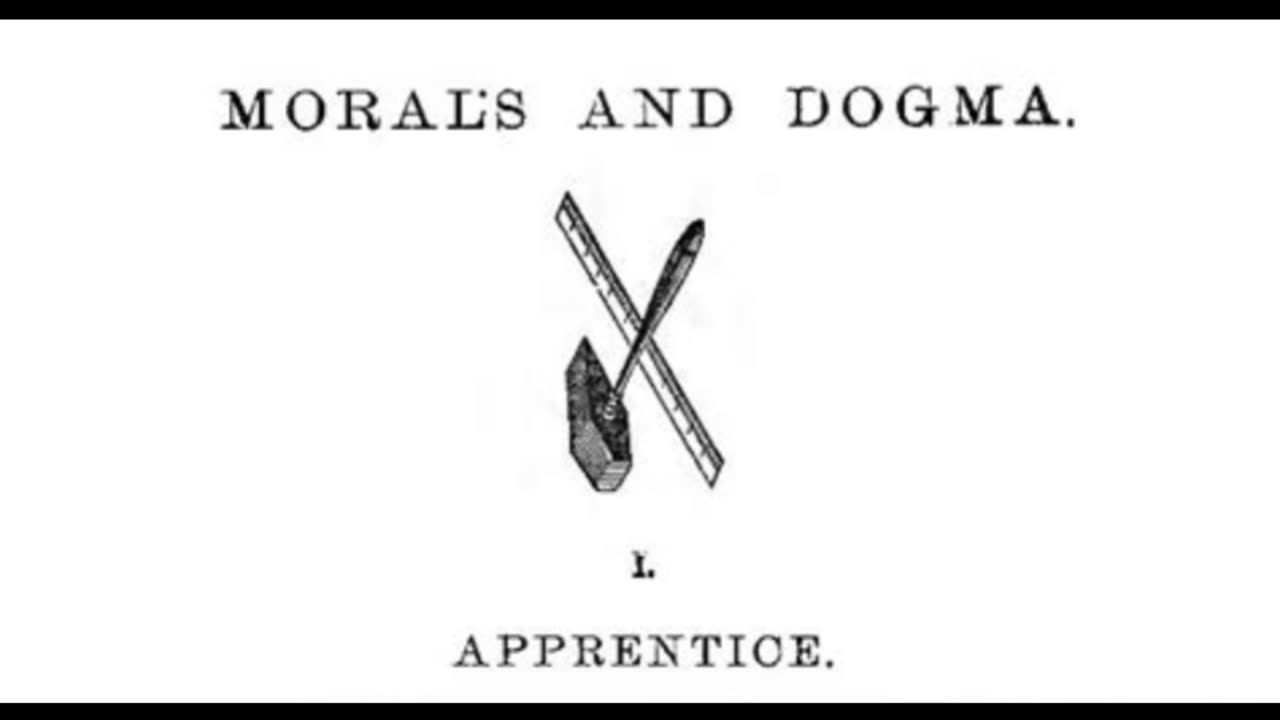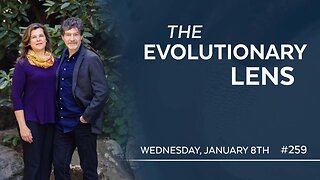Premium Only Content

Chapter 1º - Apprentice - Morals & Dogma of the Ancient & Accepted Scottish Rite of Freemasonry
This chapter addresses the first degree of the Scottish Rite of Freemasonry, the Entered Apprentice. This chapter serves as an introduction to the fundamental principles of Freemasonry, setting the stage for the deeper and more esoteric lessons explored in subsequent degrees. The Entered Apprentice degree is depicted as the gateway through which one enters the world of Masonic symbolism, philosophy, and ethics.
Pike uses this chapter to discuss the symbols and tools associated with the degree, such as the rough ashlar, the square, and the compasses, interpreting them as tools for personal and moral development. He emphasizes the importance of knowledge, self-awareness, and the continuous pursuit of truth as foundational virtues for any Mason. The chapter is rich with allegorical content, aiming to instruct the new initiate in the virtues of silence, obedience, and humility—qualities essential for the building of character and the foundation of a meaningful Masonic journey.
Moreover, Pike explores the themes of light and darkness, knowledge and ignorance, which are central to the Masonic initiation experience. The Apprentice is encouraged to seek light through education and moral rectitude, moving from a state of spiritual darkness to a state of enlightenment. This transformation is symbolic of the broader Masonic goal of improving oneself and, by extension, society.
The discourse in this chapter provides listeners with insights into how Masonry views the role of the individual in society and the importance of ethical conduct and continuous learning. It sets the tone for the intricate teachings of the Scottish Rite and underscores the lifelong commitment to personal and communal improvement that Masonry advocates.
About the Book:
Morals & Dogma of the Ancient and Accepted Scottish Rite of Freemasonry was first published in 1871 and authored by Albert Pike, who was a deeply influential figure within the Scottish Rite. The book is a comprehensive collection of philosophical and instructional essays on each degree of the Scottish Rite, from the 1st to the 33rd. It is considered one of the most profound and enduring works on Freemasonry, reflecting Pike’s vast knowledge of philosophy, esotericism, and various religious traditions.
The work is structured into 32 chapters, each corresponding to one of the Masonic degrees of the Scottish Rite, with an additional introductory chapter on the 33rd degree. Pike elaborates on the symbolic, ethical, and philosophical teachings associated with each degree, making extensive use of allegorical and scriptural references to explore themes such as morality, justice, and truth.
Morals & Dogma is revered not only for its depth in explaining the symbolic meanings of Masonic rituals but also for Pike’s efforts to contextualize Masonic teachings within the broader scope of Western and Eastern philosophical thought. His interpretations draw from a myriad of sources, including Biblical scriptures, classical philosophy, medieval Kabbalah, and other mystical and religious texts, showcasing Freemasonry as a unique conduit for spiritual and moral development.
The book’s enduring relevance comes from its ability to weave complex theological, philosophical, and historical threads into a coherent system of moral conduct and metaphysical understanding. It serves as both a guide and a philosophical treatise, intended to inspire contemplation and ethical conduct among Masons.
While Morals & Dogma has historically been a key manual for those within the Scottish Rite, its appeal extends beyond Masonic circles due to its rich discussions of morality and spirituality. It remains a significant work for anyone interested in the philosophical underpinnings of fraternal orders or in the broader dialogue between ancient wisdom traditions and modern ethical challenges.
About the Author:
Albert Pike (1809–1891) was a multifaceted American figure known for his roles as a lawyer, writer, soldier, and influential Freemason. Born in Boston, Massachusetts, Pike moved to the frontier, which today is Arkansas, where he practiced law, worked as a journalist, and engaged in various political activities.
Pike's Masonic journey is as storied and complex as his public life. He was deeply involved in the development of the Scottish Rite of Freemasonry and became the Sovereign Grand Commander of the Southern Jurisdiction of the Scottish Rite from 1859 until his death in 1891. Under his leadership, the Scottish Rite flourished, and Pike authored Morals and Dogma of the Ancient and Accepted Scottish Rite of Freemasonry in 1871, a book that remains a cornerstone of Masonic literature.
Beyond the Scottish Rite, Pike was active in many other Masonic bodies. He was a founding officer of the Knights of the Golden Circle and was involved in the development of several York Rite bodies. His Masonic work extended internationally; he played a crucial role in promoting and organizing Freemasonry in Europe and Latin America.
During the American Civil War, Pike served as a brigadier general in the Confederate States Army, commanding the District of Indian Territory. His service in this capacity was marked by controversies, including disagreements with superior officers and the government's policies toward Native American tribes. Despite his military and political engagements, his contributions to Masonic scholarship and ritual remain his most enduring legacy.
Pike's interests and writings spanned a wide range of subjects, including philosophy, astrology, and comparative religion, which influenced his Masonic writings and teachings. His intellectual pursuits reflected his belief in the universality of all religions and the synthesis of philosophical truths across different cultures.
Albert Pike's life was characterized by his vigorous intellect, his dedication to the ideals of Freemasonry, and his controversial role in the historical events of his time. His Masonic work, especially through Morals and Dogma, continues to be studied and revered in Masonic circles worldwide, cementing his place as one of the most significant figures in the history of Freemasonry.
-
 3:59:19
3:59:19
Deus Meum Que Jus
1 month agoThe Kybalion: A Study of the Hermetic Philosophy of Ancient Egypt and Greece By: The Three Initiates
627 -
 1:00
1:00
Congresswoman Harriet Hageman
4 hours agoCongresswoman Harriet Hageman Rumble Rollout
8818 -
 LIVE
LIVE
Melonie Mac
1 hour agoGo Boom Live Ep 33!
230 watching -
 13:08
13:08
RealitySurvival
8 hours agoNorth American Union - Why THIS IS A BAD Idea!
132 -
 DVR
DVR
Redacted News
3 hours agoWEF is in FULL PANIC MODE over Trump, LA wildfires a failure of liberal government | Redacted News
53.4K109 -
 DVR
DVR
vivafrei
7 hours agoInterview with Enrique Tarrio's Mother - Viva Frei Live
54.8K19 -
 53:07
53:07
Candace Show Podcast
2 hours agoBlake Lively VS Justin Baldoni: The Revenge of #MeToo | Candace Ep 128
45K51 -
 1:59:04
1:59:04
Darkhorse Podcast
5 hours agoThe 259th Evolutionary Lens with Bret Weinstein and Heather Heying
31.7K18 -
 1:42:19
1:42:19
Film Threat
5 hours agoHOLLYWOOD IS ON FIRE! | Hollywood on the Rocks
10.3K2 -
 9:53
9:53
Gun Owners Of America
5 hours agoConstitutional Concealed Carry Reciprocity Introduced to Congress!
27.6K8